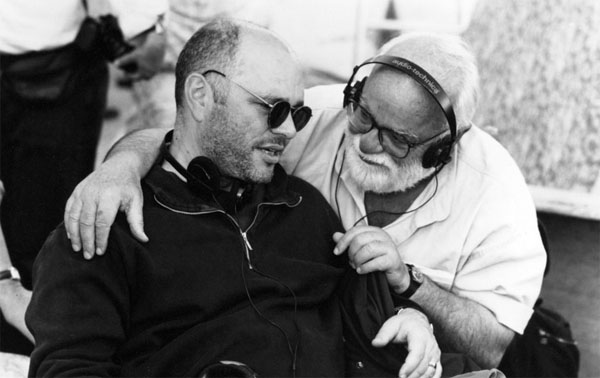“The winner of three Best Picture Oscars and the Academy’s coveted Irving Thalberg Award, Saul Zaentz fought for quality and boasted extraordinary taste which he never compromised,” writes Anne Thompson. “Paul Zaentz wrote in an email that his uncle, who was 92, died Friday…. Zaentz, born of immigrant Jewish parents in Passaic, New Jersey, defined the creative producer. He painstakingly developed material for years, was willing to mortgage his Zaentz Film Center for financing if need be, and saw every movie through to completion and release. His first film, Darryl Duke’s Payday (1972), was a gritty indie starring Rip Torn as a tough country singer. Next the producer backed One Flew Over the Cuckoo’s Nest, the surprise United Artists drama that took home five Oscars in 1976 including Best Picture, Best Director (Milos Forman) and Best Actor (Jack Nicholson). Originally acquired for the screen by Kirk Douglas, his son Michael Douglas brought in Zaentz, who nurtured and willed it into existence.”
Duane Byrge and Mike Barnes for the Hollywood Reporter: “His third film was the internationally acclaimed The Unbearable Lightness of Being (1988), nominated for a pair of Academy Awards.” And Variety‘s Pat Saperstein notes that the film introduced “American audiences to such future Oscar winners as Daniel Day Lewis and Juliette Binoche. [Director Philip] Kaufman sued for a higher salary, and Zaentz paid him $150,000 as part of a Directors Guild settlement.”
Zaentz was, as Saperstein puts it, “famously litigious.” Jeremy Kay for Screen: “During his time in music, Zaentz worked at Fantasy Records and championed Creedence Clearwater Revival before famously going to war in the courts with the band’s lead singer John Fogerty.” That war’s chronicled in more detail in THR and Variety. Then there’s the Lord of the Rings saga. Zaentz acquired the rights to Tolkein’s trilogy and The Hobbit in 1976 and produced Ralph Bakshi’s animated version of The Lord of the Rings. After that, the road to Peter Jackson’s live action blockbusters grows crooked and sprouts countless tributaries (disputes over merchandizing, video games, etc.). The best overview of the whole mess may be the Wikipedia entry on Zaentz’s Middle-earth Enterprises.
At TheWrap, Sharon Waxman notes that Zaentz’s two other Best Picture Oscar winners are Milos Forman’s Amadeus (1984) and Anthony Minghella’s The English Patient (1996). Zaentz also produced Peter Weir’s The Mosquito Coast and his last film was his third collaboration with Forman, Goya’s Ghosts (2005). Waxman: “Zaentz was part of a group of cineastes and filmmakers who worked in the San Francisco area, including Kaufman, Francis Ford Coppola, George Lucas and others. In 1980 Zaentz created The Saul Zaentz Film Center in Berkeley, an editing and sound-mixing studio for his own films, independent filmmakers and Hollywood productions.”
THR quotes from Zaentz’s biggest acceptance speech, the one delivered in 1996: “The Irving Thalberg Award memorializes a giant among giants who brought us a sense of film history. This belongs to the many with whom I have shared dreams and journeys. My cup is full. Thank you.”
Update, 1/21: Richard Corliss remembers Zaentz for Time.
For news and tips throughout the day every day, follow @KeyframeDaily on Twitter and/or the RSS feed. Get Keyframe Daily in your inbox by signing in at fandor.com/daily.




